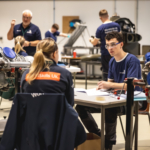‘Young people losing hope over life chances’ (Guardian); ‘Young deeply pessimistic about social mobility’ (BBC). The recently published Social Mobility Barometer unquestionably makes for challenging reading for all of us interested in seeing our young people succeed in work and life.
The Barometer shows that most people in the UK believe that where you end up in life is determined by where you’re from and who your parents are. Worryingly, this rises to 51% of 18-24 year olds, with over half of the same age group believing the situation is getting worse.
Clearly, we’ve got a problem in the UK with social mobility. What the Social Mobility Barometer shows is not only is this difference real but its consequences are deeply felt by people. I don’t want to just lament the Barometer’s findings, as I’m not sure it takes us very far. The more interesting question is how we can address the challenge. So amidst the very troubling data, there is a glimmer of hope we should look to.
It’s somewhat paradoxical too, as whilst 18-24 year olds are clearly very concerned about social mobility, they’re actually the most optimistic that those from less advantaged backgrounds can get on in life. Thirty per cent of 18-24 year olds said they think it’s becoming easier compared to just half that number from the 25-49 age group.
I think that greater sense of optimism is rooted in our young generation’s innate ability to tackle a challenge and make the most of it. It’s the kind of spirit I witness whenever I meet members of Team UK who are currently training for WorldSkills Abu Dhabi 2017. At these ‘Skills Olympics’ they’ll be taking on the best of the best from over 75 nations. Background is irrelevant of course when it comes to world-class competition, but there’s actually a really positive message from Team UK when it comes to social mobility. The vast majority of Team UK past and present are products of their local state schools and FE colleges. That’s a real statement about the ability of the UK’s education system to give our young people the start in life they deserve.
What Team UK members go on to do after the competitions have finished demonstrates equally their own individual drive and will to succeed. Our alumni include numerous entrepreneurs, key employees at household-name organisations and inspirational mentors to the next generation of young people.
Team UK is living proof of the possibility of British social mobility and I think the simple lesson is that investing in young people’s skills and building their confidence can really help accelerate their progress in work and life.


